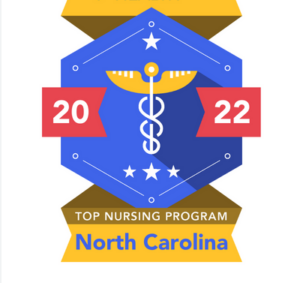The Top Nursing Schools in North Carolina of 2025 & 2026
 North Carolina is a great place to pursue nursing education.
North Carolina is a great place to pursue nursing education.
With 48 approved associate in nursing (ADN) programs and 24 bachelor’s in nursing degree programs (BSN), the state offers many options for future nurses.
These programs have some of the highest NCLEX pass rates in the country, which is a key factor for nursing students.
In addition, North Carolina is a Nurse Licensure Compact (NLC) state, meaning that nurses who graduate from accredited schools in the state can obtain a multistate nursing license that allows them to practice in 37 states.
For those looking to pursue specialized roles, North Carolina also offers top RN to BSN programs, as well as advanced practice registered nurse (APRN) programs, such as nurse practitioner (NP) programs. Whether you’re looking for traditional programs, accelerated nursing programs in North Carolina, or online options, there’s something for everyone in the state.

Struggling to meet your deadline?
Get your assignment on The Top Nursing Schools in North Carolina of 2025 & 2026 done by certified MDs and PhDs in the USA. ORDER NOW!
Benefits of Attending Nursing School in North Carolina
Attending a nursing school in North Carolina offers many benefits. First, the state has a strong healthcare system, with numerous hospitals and medical centers, making it a great place for clinical placements and hands-on experience. The Nursing job opportunities in NC are plentiful, with healthcare systems like Atrium Health in Charlotte and Duke University Health System in Durham hiring thousands of nurses each year. Additionally, the nursing salaries in NC 2025 are competitive, especially when you factor in the state’s lower cost of living compared to other regions like California or New York.
As a Nurse Licensure Compact state, North Carolina offers nurses the opportunity to obtain a multistate nursing license, which is beneficial for those interested in practicing across state lines. This is particularly attractive for nurses who may want to relocate or travel for work without needing to get licensed in every state.
Top Nursing Schools in North Carolina: Ranking and Overview
Choosing the best nursing school in North Carolina depends on your goals. For those looking for a Bachelor of Science in Nursing (BSN), there are several top-ranked schools to consider. Some of the best nursing schools in NC include:
- Duke University: Known for its high standards, Duke offers one of the best nurse practitioner programs in NC and a highly respected Master of Science in Nursing (MSN) program.

- University of North Carolina at Chapel Hill (UNC): UNC offers both BSN and advanced practice registered nurse (APRN) programs that are well-regarded across the country.
- East Carolina University (ECU): ECU offers a strong RN to BSN program and has excellent NCLEX pass rates in North Carolina.
Comprehensive list of the Best Nursing Schools in North Carolina
1. University of North Carolina at Chapel Hill School of Nursing
- Location: Chapel Hill, NC
- Website: https://nursing.unc.edu
- Description:
The University of North Carolina at Chapel Hill School of Nursing (UNC SON) is consistently ranked among the top nursing schools in the United States. Known for its rigorous academic programs and emphasis on clinical excellence, UNC’s nursing school offers a wide range of nursing degrees, including BSN, MSN, DNP, and Ph.D. in Nursing. The program is renowned for its commitment to research, leadership, and community engagement, preparing students to become nursing leaders and change-makers in healthcare. UNC SON’s BSN program provides students with a solid foundation in nursing theory and practice, with opportunities for clinical rotations at prestigious institutions such as the UNC Medical Center. The MSN and DNP programs offer specialized tracks in Family Nurse Practitioner (FNP), Adult-Gerontology Nurse Practitioner (AGNP), and Nurse Anesthesia, among others. UNC is especially known for its research-focused faculty, who are engaged in groundbreaking studies in areas such as health disparities, nursing education, and clinical care innovations. This focus on research not only benefits students but also contributes to improving healthcare policies and practices on both a local and global scale. - Accreditation: CCNE
- Tuition: Approx. $10,000 per year (in-state undergraduate)
- Programs: Family Nurse Practitioner, Nurse Anesthesia, Adult-Gerontology Nurse Practitioner, Ph.D. in Nursing
2. Duke University School of Nursing
- Location: Durham, NC
- Website: https://nursing.duke.edu
- Description:
Duke University School of Nursing is a prestigious institution that offers cutting-edge education and training in nursing. Known for its excellence in clinical practice, research, and leadership, Duke provides a variety of advanced nursing programs, including BSN, MSN, DNP, and Ph.D. in Nursing. The BSN program at Duke prepares students to provide high-quality, compassionate care while fostering a strong foundation in evidence-based practice. Duke’s MSN and DNP programs offer specialized tracks such as Family Nurse Practitioner (FNP), Nurse Anesthesia, and Nurse Leadership. Students gain hands-on experience through clinical placements in renowned healthcare facilities, including the Duke University Medical Center, one of the top hospitals in the nation. Duke’s nursing programs are highly research-driven, offering students opportunities to engage in innovative studies in healthcare delivery, patient safety, and healthcare disparities. The Ph.D. in Nursing program focuses on advancing knowledge in nursing science and improving health outcomes. Duke University is a global leader in nursing education, offering students access to world-class resources, faculty, and research opportunities. - Accreditation: CCNE
- Tuition: Approx. $58,000 per year (graduate)
- Programs: Family Nurse Practitioner, Nurse Anesthesia, Nurse Leadership, Ph.D. in Nursing
3. North Carolina Central University School of Nursing
- Location: Durham, NC
- Website: https://www.nccu.edu
- Description:
North Carolina Central University (NCCU) School of Nursing is dedicated to providing high-quality nursing education, with a focus on preparing students for leadership roles in the healthcare field. The school offers BSN, MSN, and RN-to-BSN programs, each designed to provide students with the skills and knowledge necessary for successful careers in nursing. NCCU’s BSN program emphasizes clinical excellence, cultural competence, and community service, preparing students to work in diverse healthcare settings. The MSN program offers specialized tracks in Family Nurse Practitioner (FNP) and Nurse Educator, providing students with the expertise needed to care for individuals and families across the lifespan. NCCU also offers an RN-to-BSN program that is ideal for registered nurses who want to expand their knowledge and take on more advanced roles in healthcare. The school’s commitment to addressing health disparities, particularly in underserved communities, makes it an excellent choice for students who want to make a difference in public health and community nursing. NCCU also offers extensive clinical placements in local hospitals and clinics, ensuring students gain real-world experience. - Accreditation: CCNE
- Tuition: Approx. $5,000 per year (undergraduate, in-state)
- Programs: Family Nurse Practitioner, Nurse Educator, RN-to-BSN
4. University of North Carolina at Charlotte School of Nursing
- Location: Charlotte, NC
- Website: https://nursing.uncc.edu
- Description:
The University of North Carolina at Charlotte School of Nursing is a leading institution that offers a diverse range of nursing programs designed to prepare students for advanced practice and leadership roles in healthcare. UNC Charlotte’s BSN program provides students with the essential clinical and academic training required for a career in nursing, with opportunities to engage in clinical placements at local hospitals and healthcare facilities. The MSN program offers specializations such as Family Nurse Practitioner (FNP) and Nurse Leadership, providing students with advanced skills and knowledge in patient care, healthcare management, and evidence-based practice. The school’s faculty are experts in their fields, with a strong focus on research and nursing innovation. Students at UNC Charlotte benefit from a collaborative learning environment that fosters growth, clinical expertise, and critical thinking. The DNP program is designed for nurses who want to engage in advanced clinical practice or leadership roles, equipping them with the skills to drive healthcare improvements. UNC Charlotte’s commitment to improving healthcare in the community and its dedication to addressing health disparities make it an ideal choice for students passionate about making a positive impact on society. - Accreditation: CCNE
- Tuition: Approx. $9,000 per year (in-state undergraduate)
- Programs: Family Nurse Practitioner, Nurse Leadership, DNP
5. Winston-Salem State University School of Nursing
- Location: Winston-Salem, NC
- Website: https://www.wssu.edu
- Description:
Winston-Salem State University School of Nursing is committed to training the next generation of skilled nurses who are prepared to lead in diverse healthcare environments. The school offers a BSN program that is focused on preparing students for the complexities of modern nursing practice, with an emphasis on clinical competence, evidence-based practice, and caring for underserved populations. The nursing program is supported by faculty members who are experts in their fields and committed to providing students with a high-quality education. Students in the BSN program have access to clinical placements in local hospitals and clinics, where they gain hands-on experience working with diverse patient populations. Winston-Salem State University also offers an RN-to-BSN program for registered nurses who wish to advance their education and take on leadership roles in healthcare settings. The nursing school’s emphasis on community health and public health initiatives ensures that students are well-equipped to address the healthcare needs of vulnerable populations. - Accreditation: CCNE
- Tuition: Approx. $6,000 per year (in-state undergraduate)
- Programs: RN-to-BSN, BSN
6. Gardner-Webb University School of Nursing
- Location: Boiling Springs, NC
- Website: https://www.gardner-webb.edu
- Description:
Gardner-Webb University School of Nursing offers a comprehensive education in nursing, focusing on holistic care, clinical practice, and spiritual health. The school offers a BSN program, as well as an RN-to-BSN program, catering to both traditional students and working nurses who want to further their education. Gardner-Webb is known for its Christian-centered approach to nursing education, emphasizing compassion, ethical practice, and cultural competence. The BSN program combines classroom education with clinical experiences at hospitals, clinics, and healthcare facilities in the area. The university’s RN-to-BSN program is ideal for registered nurses who wish to expand their knowledge and pursue higher-level nursing roles. The faculty at Gardner-Webb are highly experienced and supportive, providing personalized instruction and mentorship to ensure students succeed. The school’s commitment to community outreach, healthcare advocacy, and preparing nurses who are well-rounded in both technical and compassionate care makes it an excellent choice for those seeking a well-rounded nursing education. - Accreditation: CCNE
- Tuition: Approx. $20,000 per year (undergraduate)
- Programs: RN-to-BSN, BSN

These are just a few of the leading nursing schools in North Carolina, each offering specialized programs to prepare the next generation of nurses for leadership roles. With a combination of research-driven education, clinical experience, and community engagement, these schools provide an excellent foundation for students pursuing careers in nursing
When comparing nursing programs, consider factors like program accreditation, the NCLEX pass rate, tuition costs, and the availability of clinical placements in your area. Schools with high job placement rates are also a good indicator of program quality.
Top RN to BSN Programs in North Carolina
If you’re a registered nurse (RN) looking to further your education and earn your BSN, North Carolina has some of the top RN to BSN programs. These programs are designed for RNs who already have an ADN and want to complete a BSN degree to expand their career options.
- University of North Carolina at Greensboro: Offers a flexible RN to BSN program with a strong reputation.
- Appalachian State University: Known for offering an affordable RN to BSN program with high job placement rates.
These programs are often designed to be flexible for working nurses, offering online nursing programs North Carolina or evening and weekend classes.
How to Choose the Best Nursing Program for You
When selecting a nursing school, think about what’s most important for your personal and career goals. Do you want to become a nurse practitioner, or are you aiming for a leadership role in healthcare? Do you need flexibility, or are you able to commit to a full-time, in-person program? Here are some factors to consider:
- NCLEX pass rates: Choose a school with a high NCLEX pass rate, which indicates that the program prepares students well for the national licensure exam.
- Accreditation: Make sure the school is accredited by a recognized body, such as the Commission on Collegiate Nursing Education (CCNE) or the Accreditation Commission for Education in Nursing (ACEN). This is important for both education quality and licensure.
- Tuition costs: Nursing school can be expensive. Look for programs that offer low tuition rates or financial aid options.
- Program flexibility: If you need to work while attending school, look for online nursing programs in North Carolina or part-time options.
Salary Expectations and Job Outlook for Nurses in NC
Nurses in North Carolina earn competitive salaries, though they may be slightly lower than the national average. However, the state’s lower cost of living helps offset this difference. According to the U.S. Bureau of Labor Statistics (BLS), the average salary for an RN in North Carolina is $68,950, while Nurse Practitioners (NPs) earn $108,370 annually.
- Highest-Paying Cities for Nurses in North Carolina include Fayetteville, Winston-Salem, Charlotte, and Raleigh. For example, RNs in Fayetteville earn an average of $75,530, which is among the highest in the state.
The nursing job market in North Carolina is growing, with a projected 12.1% increase in RN jobs and 28.2% growth in NP roles by 2028.
Steps to Becoming a Nurse in North Carolina
To become a nurse in North Carolina, you must follow these steps:
- Complete an accredited nursing program: Choose between an Associate Degree in Nursing (ADN) or a Bachelor of Science in Nursing (BSN). The best nursing schools in NC offer both types of programs.
- Pass the NCLEX exam: After completing your nursing program, you must pass the National Council Licensure Examination (NCLEX) to become licensed as an RN in North Carolina.
- Submit a background check: North Carolina requires a criminal background check as part of the licensing process.
- Obtain licensure: Once you pass the NCLEX and complete the necessary paperwork, you can apply for your nursing license.
Advanced Practice Registered Nurse (APRN) Requirements
If you want to specialize as an Advanced Practice Registered Nurse (APRN), which includes becoming a nurse practitioner (NP), you must:
- Complete a Master of Science in Nursing (MSN) or Doctor of Nursing Practice (DNP) program.
- Obtain board certification in your area of specialty.
- Maintain licensure and board certification with ongoing continuing education.
North Carolina offers some of the top nurse practitioner programs in NC, including those at Duke University and UNC-Chapel Hill, which are well-regarded nationally.
Frequently Asked Questions About Nursing in North Carolina
- How long does it take to become an RN in North Carolina?
It typically takes 2 years for an ADN and 4 years for a BSN. If you’re pursuing an RN to BSN, it will take less time, depending on the program. - How much do nurses make in North Carolina?
The average salary for an RN is $68,950, and for NPs, it’s $108,370. These salaries can vary by location, education level, and experience. - How much does nursing school cost in North Carolina?
Nursing programs in North Carolina vary in cost. ADN programs may cost between $6,000 and $40,000, while BSN programs can range from $40,000 to $200,000. Advanced degrees, such as BSN-to-MSN or MSN-to-DNP, will cost more. - Is North Carolina a good state for nurses?
Yes! North Carolina has a growing nursing job market, competitive salaries, and a lower cost of living. It is also a Nurse Licensure Compact (NLC) state, which allows nurses to practice in 37 states with a single license. - Does North Carolina have a nursing shortage?
Yes, North Carolina is facing a nursing shortage, with a projected shortage of 13,000 nurses by 2026. However, this means there will be more job opportunities for qualified nurses in the coming years.
By understanding these key factors—nursing degree programs in North Carolina, the nursing licensure process, and salary expectations—you’ll be well on your way to making informed decisions about your nursing education and career. Whether you’re interested in becoming an RN, advancing to a BSN, or pursuing an APRN or NP role, North Carolina offers a wealth of options to help you succeed.

Dont wait until the last minute.
Provide your requirements and let our native nursing writers deliver your assignments ASAP.

